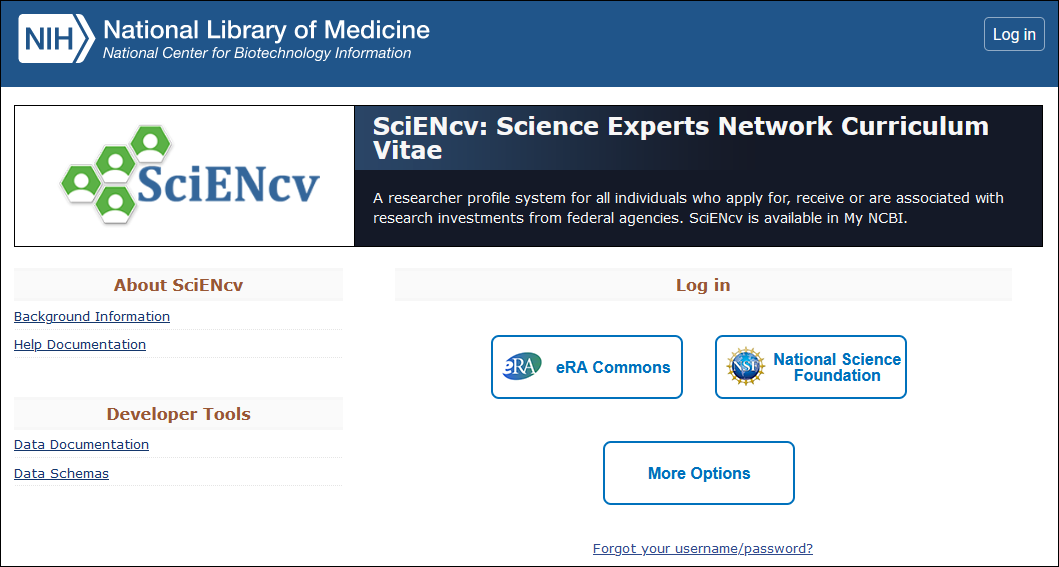SciENcv
The Biosketch and Current and Pending Support Power Tool
Science Experts Network Curriculum Vitae (SciENcv) is a function within the National Center for Biotechnology Information's My NCBI web application. NIH eRA Commons, NSF, and Open Researcher and Contributor IDentifier (ORCID) account holders who link their accounts to NCBI can populate their SciENcv profiles with the information stored in their eRA, NSF, or ORCID accounts. The information transferred to SciENcv can then be changed, hidden, augmented, or deleted. SciENcv users have full control of the content displayed in their SciENcv profiles.
SciENcv currently supports the preparation of:
- National Institutes of Health (NIH) Biosketches
- National Institutes of Health (NIH) Fellowship Biosketches
- National Science Foundation (NSF) Biographical Sketches*
- National Science Foundation (NSF) Current and Pending (Other) Support*
- Institute of Education Sciences (IES) Biosketches
Access SciENcv through My NCBI

NCBI Login Options:
- eRA Commons
- National Science Foundation (NSF) Research.gov
- NCBI account
- Third-party sign-in option:
- Click More Options >> other login options >> more login options. Type Stanford and select "Stanford University" to sign as a Partner Organization
- ORCID
Delegating SciEncv Access
My NCBI users can grant access to other persons (delegates) to view and manage their SciENcv documents. The delegates will then be able to create, modify or delete the information in the SciENcv account to which they have been granted access.
How to set a delegate
- Investigators: Login to your NCBI account
- Click on your username in the top-right corner of the screen. Click Account Settings
- From your Account Settings page, under “Delegates,” click Add a delegate
- Enter your delegate's email address and click OK
- What happens next:
- Your delegate will receive an e-mail notifying them of access.
- Your delegate will click a link in the e-mail to activate access.
- If your delegate does not have a My NCBI account, they will be invited to register.
- What happens next:
Merging Multiple Accounts
If you suspect, or want to check to see if you have multiple My NCBI accounts, write to the NCBI help desk at info@ncbi.nlm.nih.gov and include the following in your message:
- NCBI username
- eRA Commons username (if any)
- any email addresses that may be associated with your account(s) e.g. your Stanford email address.
If multiple My NCBI accounts do exist, the help desk can assist in merging them into a single account. All existing linked accounts will transfer to the single account. The single account will contain all contents of the accounts including saved searches, collections, bibliography entries, etc.
Additional SciENcv Resources
Create & Manage My NCBI Access for Delegates
SciENcv Background Information
Benefits of SciENcv
- Pulls information from other systems, including My NCBI, and ORCID
- Reduces duplicate data entry and allows quick creation and recreation of approved formatted biosketches and current and pending support documents for applications and reports
- Allows granting of delegate access to administrators who support researchers
- Helps create online professional profiles that can be made public and shared with other researcher
- Documents education, employment, research activities, publications, honors, research grants, and other professional contributions
Notes for NSF SciENcv Current and Pending Support
- SciENcv requires at least 0.01 person months to be entered for any person month entry. Moreover, keeping in mind one of the primary purposes of a Current and Pending document/disclosure is for sponsors to assess the capacity of investigators to take on new projects, the Person-Month(s) or (Partial Person-Months) per year listed for a project should always be a reasonable approximation of how much time the individual is planning to spend to complete the scope of work on the given project, even if project does not require a measurable effort commitment, as is commonly the case for University Research Awards (URAs) and seed grants.
- In SciENcv the In-Kind Contribution summary of contributions cannot exceed 300 characters.